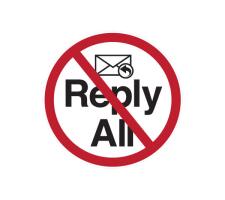
Embarrassment is often a person’s first reaction after hitting “reply to all” when sending an email that required only a “reply.”1 If the email was inappropriate, the sender suffers, at a minimum, a wave of panic and dread. When the sender is a lawyer, the suffering may not end with just panic and dread.
The Illinois State Bar Association recently released an advisory opinion addressing the ethical implications of a “reply to all” response by a lawyer when a represented person is included among the recipients. See ISBA Professional Conduct Advisory Op. No. 19-05 (Oct. 2019). The opinion notes that a lawyer who “carbon copies” a client on an email does not give implied consent for a recipient lawyer to communicate directly with the “cc’d” client by “replying all.” Said the committee, “instead of assuming that a lawyer who has copied his own client on an [email] has invited opposing counsel to include the client in reply,” the replying lawyer “must make a good faith determination” as to whether consent has been granted.” To violate the applicable standard of conduct, Rule 4.2, the lawyer must have actual knowledge of the recipient’s status as a represented party.
How can a lawyer avoid a “reply to all” problem? The opinion provides the following advice:
- Do not copy clients on emails with opposing counsel. Be courteous of your opposing counsel and don’t put them in the position to violate professional conduct standards.
- Discuss email practices with opposing counsel and establish ground rules for when it is permissible to “cc” clients on emails.
- To avoid inadvertent communications, forward or “bcc” emails to your client rather than using the “cc” function.
- Upon receiving an email from a lawyer with an unknown party cc’d, confirm the person’s role in the litigation.
- Upon receiving an email from a lawyer with that lawyer’s client included as “cc” recipient, do not assume that the lawyer has consented to a subsequent “reply to all.” Instead, ask the sending lawyer whether a “reply to all” is acceptable.
- Special thanks to Spring 2020 Lawyering III student Charles Meeks for researching and writing the initial draft of this post. ↵
